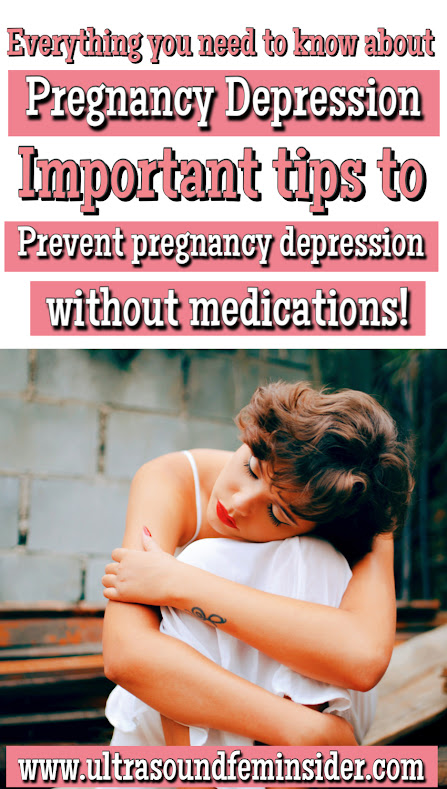If you’re pregnant, is very possible that you’ve heard about postpartum depression. But did you know that many women also experience depression during pregnancy?. Pregnancy is a period in a woman’s life when several physical and emotional changes are occurring on a daily basis. There is a life, a whole new person growing inside of you and when this person is born, he or she will be totally helpless and dependent on you. To some women pregnancy is a source of joy and excitement as they anticipate the responsibility of motherhood, especially for first time moms. However, to other women, this responsibility is a source of a particular type of depression known as Pregnancy Depression. In this article we are going to talk about pregnancy depression, I am also giving you important tips to prevent naturally this condition. Ready? Let’s begin.
First of all, What is Pregnancy Depression?
Depression is one of the most common psychiatric disorder. Depression has both physiological as well a sociological causes. It is actually caused by a number of different factors. But, it is most likely to be linked to a change in the levels of chemicals in the brain. These chemicals govern our moods, and when they become disrupted, it can lead to depression. During pregnancy, the rapid change in a woman’s body’s hormones can trigger a change in the levels of these chemicals, resulting in depression.
Although pregnancy depression can be triggered by the pregnancy and associated factors itself, it may be as a result of a previous state of other forms of depression. This is why being depressed while being pregnant should be addressed and approached differently.
Causes of Pregnancy Depression.
It has been proven that the rapid rise in hormone levels during pregnancy is actually a very common trigger for depression. At least 20% of pregnant women experience some depressive symptoms during their pregnancies, while 10% of pregnant women develop full-blown clinical depression. Depression during pregnancy is actually much more common then many people realize.
Any pregnant woman can develop depression at some point throughout her pregnancy. There are several causes of it during pregnancy, some of which are the following:
- Having a personal or family history of depression.
- Relationship or marital conflict.
- Age at time of pregnancy.
- Unplanned pregnancy.
- Living alone, without support or help.
- Limited social support.
- Pregnancy confusions and complications.
- History of emotional, physical or sexual abuse.
Why treating appropriately pregnancy depression is so important?
Because depression can often drain a woman’s desire and energy, pregnant women with this disorder may not seek appropriate prenatal care. Depression during pregnancy may also increase the likelihood that a pregnant woman will abuse alcohol, cigarettes, or drugs during pregnancy. When it is most severe, clinically diagnosed depression can be a psychiatric emergency. Because a woman is in a very difficult period of adjustment and less likely to climb out of her despair, hopelessness, and suffering. Therefore, she poses a danger to herself and her new baby. Also extra care must be taken on how to treat pregnancy depression as anything you ingest does have the tendency of getting into your baby’s bloodstream.
Pregnancy is a particularly active field for depression to either start anew or worsen if already a problem. The extra physical, financial, marital, and sexual stresses come whether one is ready or not. On top of that, any new feelings of poor self-image can reinforce depression’s already negative self-image problems.
Why is so important to prevent Pregnancy Depression naturally?
After discovering the side-effects of several of the so-called anti-depression drugs, many women make the decision to cease the use of some popular depression medications even as they may be going through pregnancy depression. Perhaps the fear of exposing their babies to the numerous side-effects of depression drugs may be the main concern. Well, its safe to say this may be a wise choice. However, what can one do as an alternative for treating depression during pregnancy.
Treatments for depression that are commonly recommended to pregnant women are psychotherapy and prescription drugs. For mild or non-severe cases of depression, medical experts only recommend therapy sessions as treatment.
Medications, on the other hand, are advised to severe cases of depression. These antidepressant medications are the ones prescribed by doctors as therapy drugs to use during pregnancy. Despite the efficiency of medications as treatment for serious cases of depression among pregnant women, some people are still reluctant to adhere in drug treatments for a number of safety issues.
Depression treatments for pregnant women are more carefully considered by doctors for these involve two patients: the mother and the baby. In consultations, doctors should let the future mothers know the benefits and risks associated in their recommended treatment, particularly the medications.
What are the most common symptoms of Pregnancy Depression?
- An inexplicable sadness, anxiety, or emptiness.
- Overwhelming hopelessness accompanied by pessimistic feelings.
- Extreme guilt, feelings of helplessness, and no sense of self worth.
- Loss of energy, a slowing down of metabolism, and activity levels. Being plagued by constant fatigue.
- A sense of helplessness along with an increasing inability to focus and indecisiveness.
- Loss of sound sleep and development of extreme insomnia.
- Inexplicable weight loss or weight gain. Triggered by loss of appetite or eating binges.
- Brooding and suicidal inclinations.
- Irritability, short temper, as well as restlessness.
- Physical afflictions like headaches, digestive disorders, and chronic pain for no particular reason.
Share the post.
So how can you prevent Pregnancy Depression naturally? Here you have some important tips.
1. Make Exercise part of your routine if you are able to.
This method exercises the motor centers of the brain, making the blood flow away from the emotional activity center; consequently one becomes more receptive to positive thoughts. Though I personally recommend yoga for its numerous therapeutic effects on depression, depending on the stage of your pregnancy, it may not be the safest choice, at least not while you’re pregnant. However, there are some poses you can use that alleviate pregnancy depression and actually will strengthen the lower body in preparation for childbirth. They include: The corpse/relaxation pose, the Diamond/Vajrasana Pose, The Eagle Pose, Lord of the Dance Pose, Tree Pose and Simple Yogic Square breathing exercises. Of course, exercises of the western culture such as walking, use of treadmills, bikes and things of that nature can be incorporated as alternatives for exercise. The most important thing is Keep Moving!
2. Proper Diet and nutrition.
Ladies think about this quote by the Father of Medicine, Hippocrates: let your foods be your medicine and your medicine your foods, needless to say for your health and that of the baby’s, it will be essential that you eat properly. This includes knowing what, when and how to eat even the proper foods for nourishment.
Related article: Pregnancy diet. What to eat and what to avoid during pregnancy.
3. Take your supplements.
During pregnancy it’s especially important to ensure your diet has adequate amounts of all the nutrients that you and your baby needs. Iron and zinc deficiencies, in particular, have been associated with depression in some women. Vitamin C is also vital, not just for its multiple benefits, but as an aid for iron absorption. Is also very important the appropriate intake of Omega-3 and Folate. There are several foods that you should include in your diet to intake all these vitamins and minerals, but also taking a prenatal supplement can help to correct any deficiencies you may have in your diet.
- Omega-3 fatty acids: There is good evidence to show that many pregnant women are deficient in omega-3 fatty acids, and when maternal intake is low, so is the mom’s DHA level which can affects mood. Fish oil capsules can be trusted to be mercury-free and good source of Omega-3. It’s recommended discontinuing the supplement use 2 weeks prior to the due date because of a small but possible increased risk of bleeding while supplementing.
- Folate: Important for a healthy nervous system and preventing neural tube defects in babies Taking adequate amounts of folate seem to improve prenatal depression as well. It may also have protective effects against autism in babies. It’s recommended ideally starting Folate supplements 3 month prior to pregnancy, or as soon as you realize you are pregnant.
4. Practice Positive Thinking and Praying.
Be renewed by the transformation of your thoughts (Rom 12:2) That quote says it all. What and how you think plays a very important role on your life and how you view it. This also dictates your actions towards fixing the things that may be causing or aggravating your depression during pregnancy. Read up on self-help books, your religious books (if applicable) and helpful media sources that advocates and promotes positive thinking.
5. Practice Meditation.
Meditation is an excellent way to connect with our inner selves and our emotions, and helps us to face our feelings and interact in a better way with the world around us. If you start meditating you’ll instantly feel better, as you will connect more with your body and with everything that surrounds you.
6. Rest properly.
Getting adequate sleep and rest will keep you feeling less fatigued. Proper rest will help you alleviate stress, makes you feel fresh and renovated every day. Pregnant women need to sleep for at least six to eight hours per day. Establishing good sleep patterns during pregnancy is highly effective, not only physically but also psychologically. With proper sleep, you can set your different body parts and make them energetic to perform activities the next day. Therefore, set a bedtime routine and time and stick with it no matter what.
7. Get in contact with nature.
It’s so easy to spend most of our time indoors and to forget how beneficial and uplifting even a little bit of fresh air and sunshine can be. But getting as little as 15 to 30 minutes of fresh air each day is enough to help us overcome negative feelings and depression, and with it, brighten our moods. Consider an outside walk for the double benefit of fresh air and exercise for a better mood and even better sleep.
Also sunlight therapy is a gentle treatment for depression that is mild enough to try while pregnant. Bright light therapy uses a light box that produces high-intensity light to simulate sunlight. However, nothing better that natural sunlight right?, natural sunlight will improve symptoms like fatigue, low mood, sleeping problems, and social withdrawal.
8. Find a hobby or an activity that gives you joy and happiness.
Practicing a hobby is a great way to beat depression naturally. Surely there is some activity you’ve always wanted to do and no doubt this is the best time to start. Gardening, sewing, Spanish classes and even crafts can be very useful to lift your mood. Moreover, these activities are ideal for meeting new people, making new friends, occupy your mind and stop negative thoughts resulting from depression.
9. Ask for help if you have to, and Speak up about your feelings.
Call a friend, spit it all out, tell them what is happening and, above all, how you feel. You are not alone in this, millions of people worldwide suffer from depression and have managed to succeed, however, you do need support. When we unburden and openly talk about what happens to us, our body releases oxytocin, a hormone produced by the pituitary gland in the brain that is related to trust and personal relationships. Avoid confinement, venting and sharing is part of the solution.
10. If nothing seems to help consider Professional help in the form of Therapy.
Counseling and therapy sessions can go a long way in treating depression as well, and are a safe alternative to medication for pregnant women. Cognitive behavioral therapy (CBT) involves discussions with a therapist to help identify distorted thinking patterns. This can help you adapt and change your thinking and behavior by focusing on problem-solving. If your depression is mild, a treatment like CBT can work well on its own.
Related articles you might want to check.
Postpartum depression. Causes, symptoms and prevention.
Foods To Avoid During Pregnancy.
How to avoid fetal malformations during pregnancy.
Pregnancy exercises for an easier labor and birth.
7 excellent tips to sleep better during pregnancy.
Final thoughts about Pregnancy Depression.
Preparing for a new baby is a lot of hard work, but a woman’s health should come first. A pregnant woman should resist the urge to get everything done, she should limit her activities and do things that will help her relax. Talking about things that concern a pregnant woman is also very important during these difficult times. A pregnant woman should ask for support, which most often than not, she will get. Remember that taking care oneself is an essential part of taking care of the unborn child. Empower yourself with the necessary knowledge and tools needed to accomplish this. It is my hope that this article will be helpful in that regards. Feel free to share your thoughts below.
Zadi, xo
Disclaimer: This article is for informational purposes only, is not meant to replace your doctor’s advice. Always consult with a physician for a proper diagnosis and treatment.











Very helpful, thanks.
I am glad it helps, thanks
[…] How to Naturally Prevent Pregnancy Depression. […]
[…] How to Naturally Prevent Pregnancy Depression. […]
[…] How to Naturally Prevent Pregnancy Depression. […]
[…] How to Naturally Prevent Pregnancy Depression. […]